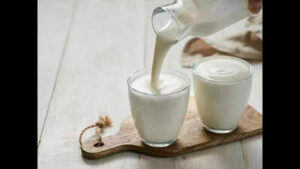In recent years, the trend of eliminating dairy from one’s diet has gained significant traction. Whether motivated by ethical concerns, environmental considerations, or health-related reasons, many individuals are opting to give up dairy products for a month to observe the impact on their overall well-being.
This dairy-free experiment can yield various results, affecting not only physical health but also mental and emotional aspects.
According to Dr Dilip Gude, senior consultant physician, Yashoda Hospitals Hyderabad, when one cuts down dairy, there is a benefit of removing excess saturated fats, sugar and salt from their diet.
“Over 3 weeks, this benefit translates to various systems in the body. Heart disease, diabetes, Alzheimer’s etc are some disorders that may worsen with daily consumption of full-fat dairy,” Dr Gude explained in an interaction with indianexpress.com.
Some people experience weight loss when they cut out dairy, as dairy products can be high in calories and fat, however, Dr K. Somnath Gupta, senior consultant physician and diabetology, Yashoda Hospitals Hyderabad, noted that this effect varies among individuals, and it’s crucial to maintain a balanced diet to avoid potential nutrient deficiencies.

Eliminating dairy for a month may lead to improvements in digestive issues for some individuals, Dr Gupta added. “Lactose, a sugar found in milk, can cause digestive discomfort in those who are lactose intolerant. Removing dairy allows the digestive system to operate without the challenge of processing lactose, potentially reducing bloating, gas, and diarrohea.”
On top of this, the acidic nature of dairy foods combined with some degree of lactose intolerance causes bloating, acidity, and extra hard work by the body to digest these products. When one quits them, it also helps restore acid/alkali balance, explained Dr Gude. Hence, those with IBS or Irritable Bowel Syndrome benefit from quitting milk.
Dr Gupta added that dairy can influence the composition of the gut microbiome. “Removing dairy may alter the balance of gut bacteria, which can have both positive and negative effects on digestive health. Individual responses to these changes can vary,” he said.
Skin health and anti-ageing benefits are known to occur within four weeks of stopping dairy consumption, said Dr Gude. According to Dr Gupta, some studies suggest a link between dairy consumption and acne, though the relationship is complex and not universally applicable. “Skin improvements could be due to factors like reduced inflammation or hormonal fluctuations associated with dairy,” he said.
 Skin health and anti-aging benefits are known to occur within 4 weeks of stopping dairy consumption. (Source: Freepik)
Skin health and anti-aging benefits are known to occur within 4 weeks of stopping dairy consumption. (Source: Freepik)
As we all know, dairy products are a significant source of calcium, vital for bone health. So, stopping their consumption may result in nutrient deficiencies like calcium, vitamin D, protein etc which need to be replenished orally either as supplements or by use of alternative foods such as soya, almonds, tofu, broccoli, figs, sunflower seeds etc.
Some other alternative sources of calcium are leafy greens, and fortified plant-based milk. “Inadequate calcium intake can impact bone density, so it’s important to ensure sufficient alternatives are consumed,” said Dr Gupta.
According to Dr Gude, breast, ovarian and prostate cancers are also linked to chronic dairy use. Metabolism, sleep, and memory are also known to improve, he added.
This might be because some people report feeling more energised after giving up dairy. “This could be related to improved digestion, reduced inflammation, or individual responses to certain dairy components. However, individual responses to dietary changes vary, and energy levels can be influenced by various factors,” said Dr Gupta.
He said individuals with lactose intolerance or a sensitivity to dairy proteins may experience improvements in respiratory conditions, such as reduced mucus production or congestion, after eliminating dairy. However, this is not a universal outcome, and individual responses vary.




